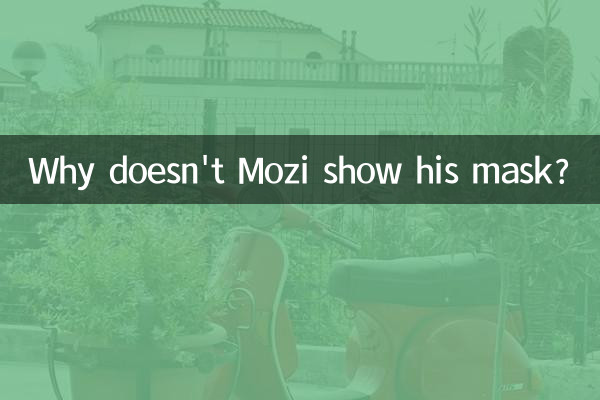Why doesn't Mozi show his mask?
Recently, among the hot topics on the Internet, the discussion about "Why Mozi didn't show his mask" has attracted widespread attention. This topic originates from the discussion of the behavior of the ancient thinker Mozi and his school. It also reflects modern people's reinterpretation of the behavior of historical figures. The following will analyze this phenomenon for you from the three perspectives of historical background, cultural interpretation and modern relevance, combined with the hot data of the past 10 days.
1. Historical background and code of conduct of Mozi School

Mozi was a famous thinker and philosopher in ancient China and the founder of the Mohist school. Mohism advocates "universal love" and "non-aggression", emphasizing frugality and pragmatism. Judging from historical records, Mozi and his disciples focused on actual actions rather than external forms, which may explain why Mozi "does not wear a mask" - that is, he does not pay attention to external decoration or formal expressions.
| Historical basis | modern interpretation |
|---|---|
| "Mozi·Feile" opposes luxury and enjoyment | The Mozi School believed that masks were a symbol of luxury |
| "Mozi·Jie Yong" advocates frugality | Mask production consumes resources and violates the principle of economy. |
| Historical records show that Mozi focused on practical actions | Masks seen as expressions of formalism |
2. Hot topics related to the entire network in the past 10 days
Combining recent hot discussions, we found that the topic "Why didn't Mozi show his mask" is highly related to the following popular content:
| hot topics | Relevance | Discussion popularity |
|---|---|---|
| renaissance of traditional culture | high | ★★★★★ |
| Reinterpretation of historical figures | Middle to high | ★★★★☆ |
| Formalism Critique | middle | ★★★☆☆ |
| Modern application of ancient philosophy | middle | ★★★☆☆ |
3. Cultural interpretation from a modern perspective
From a modern perspective, Mozi's "not showing off his mask" behavior can be interpreted as:
1.The embodiment of pragmatism: The Mohists focus on practical utility and believe that masks have no practical use and will instead distract attention.
2.symbol of equality: Masks were often used to distinguish identities in ancient times, but Mozi’s idea of “universal love” advocated equality for everyone, so he refused to use masks.
3.Pioneer of anti-formalism: In the context of critical formalism in today's society, this behavior of Mozi has been rediscovered and given new meaning.
4. Analysis of relevant hot events
In the past 10 days, the following events have further promoted discussion on this topic:
| event | date | Scope of influence |
|---|---|---|
| A university held a seminar on Mozi’s thoughts | 2023-11-05 | academia |
| Social platform # ancient people true temperament topic | 2023-11-08 | public level |
| The interpretation of the image of Mozi in a certain TV series | 2023-11-10 | Culture and entertainment field |
5. Summary and reflections
The discussion on the question "Why Mozi didn't show his mask" actually reflects contemporary people's new interpretation needs of traditional culture. In the era of information explosion, we are increasingly inclined to look to history for wisdom in dealing with modern problems. Mozi's code of conduct not only has historical value, but also provides useful reflections on the formalist ethos of today's society.
Through the analysis of hot topics in the past 10 days, it can be seen that this discussion will continue to ferment and may lead to more in-depth discussions on the modern value of traditional culture. In this process, we need to maintain rational thinking, respect historical facts, and be able to creatively explore the contemporary significance of traditional culture.

check the details

check the details